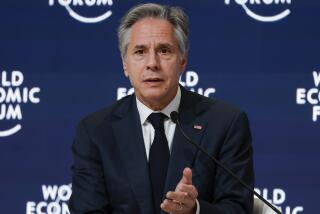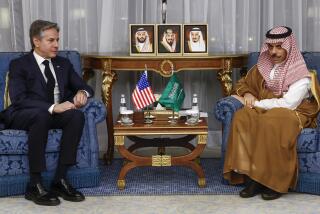Christopher to Visit Mideast This Month : Diplomacy: Secretary of state will try to patch up peace talks. Two rounds scheduled for next week are canceled.
- Share via
WASHINGTON — President Clinton on Thursday directed Secretary of State Warren Christopher to visit the Middle East later this month to try to repair the damage done to the Arab-Israeli peace talks by the stalemate over Palestinian deportees.
Although Christopher insisted that the negotiations are “on track,” he admitted that the controversy over the deportations caused him to postpone two rounds of multilateral talks scheduled for next week. But he predicted that the far more important one-on-one negotiations will resume soon.
Despite complaints by officials of the Palestinian delegation that Israel’s deportation policy had poisoned the atmosphere surrounding the negotiations for several months at least, State Department spokesman Richard Boucher said both Arab and Israeli negotiators have assured Washington that “they remain committed to the peace process.”
The U.S. optimism was buttressed by an unexpected source. Bassam abu Sharif, an adviser to Palestine Liberation Organization Chairman Yasser Arafat, said in Geneva that the talks should resume next month whether or not the dispute over the deportees is settled.
“The peace process is an important process, and the problem of the deportees is secondary,” Abu Sharif said in an interview on Swiss Radio. Abu Sharif is the PLO official most positively disposed toward peace with Israel, so his opinion may not be shared by Arafat or other top leaders of the organization that directs the Palestinian delegation to the peace talks.
Christopher plans to leave Washington on Feb. 17, probably after Clinton’s State of the Union speech, and remain in the Middle East until Feb. 24, visiting Israel, Egypt, Jordan and Syria. The Lebanese government has invited him to Beirut, but the lack of security in that capital makes a visit unlikely. On the way home, he plans to stop in Western Europe to confer with allied leaders and Russian Foreign Minister Andrei V. Koyzrev.
Clinton said in a statement that the trip is in accord with his pledge to maintain continuity in Arab-Israeli peace negotiations.
“This is a historic moment. It can slip away all too easily, but if we seize the opportunity, we can begin now to construct a peaceful Middle East for future generations,” he said.
Talking to reporters shortly before his trip was announced at the White House, Christopher predicted that the peace process would resume “at an early date.” He described as “a wise and judicious course under the circumstances” the decision to postpone the multilateral talks that had been scheduled to begin Monday.
The multilateral talks are something of a sideshow to the peace process, bringing Israel, Egypt, Saudi Arabia, other Gulf Arab states, the European Community, Japan, the United States and others together to talk about such topics as arms control, water conservation and economic programs in the whole Middle East region.
Those talks have been boycotted by Syria, Lebanon and sometimes the Palestinians, making them almost irrelevant to the core of the peace process--separate but parallel negotiations between Israel and Syria, Jordan, Lebanon and the Palestinians.
Nonetheless, the multilateral talks provided the first test of reaction to Israel’s agreement, announced Monday, to take back immediately 100 of the 396 deportees and repatriate the rest before the end of this year.
Israel deported the Palestinians, most of them members of Muslim extremist groups, in December, saying they were a threat to Israeli security. They have found refuge of sorts in a crude tent city in southern Lebanon, just over the border from Israel’s self-declared security zone.
A senior State Department official said the multilateral talks were rescheduled because the Arab parties “simply did not want to face a decision” on whether to attend in light of the deportation controversy.
U.N. Secretary General Boutros Boutros-Ghali said he welcomes Israel’s decision to allow 100 to return, but he said the rest must be sent home as well before Israel could be considered in compliance with Security Council Resolution 799 demanding immediate repatriation of all the deportees.
Nasser Kidwa, the PLO’s U.N. observer, conferred Thursday with U.N. envoys from Arab nations, urging them to intensify efforts to force Israel to comply with the resolution. He said the peace talks cannot resume until all of the deportees have been allowed to return home.
U.S. officials said the Clinton Administration is confident that it can prevent the matter from coming to another vote in the Security Council, which could attempt to levy penalties against Israel for its failure to comply.
More to Read
Get the L.A. Times Politics newsletter
Deeply reported insights into legislation, politics and policy from Sacramento, Washington and beyond. In your inbox twice per week.
You may occasionally receive promotional content from the Los Angeles Times.










